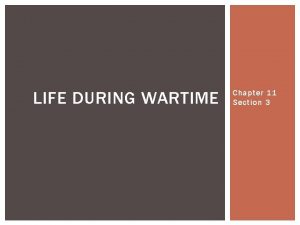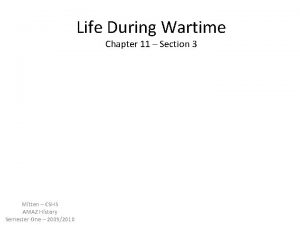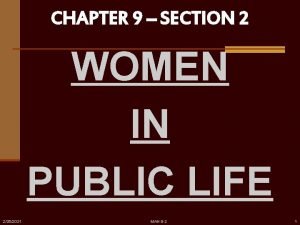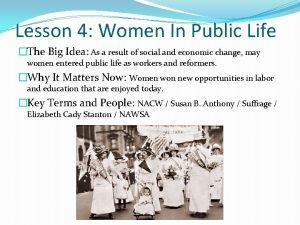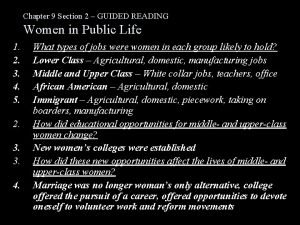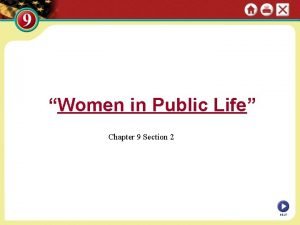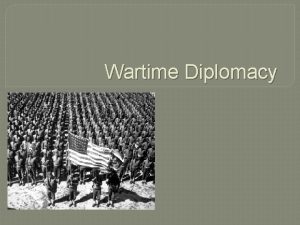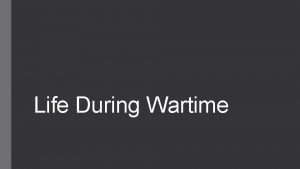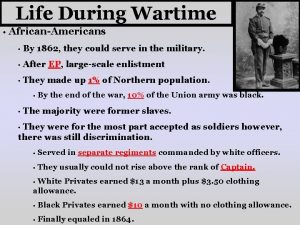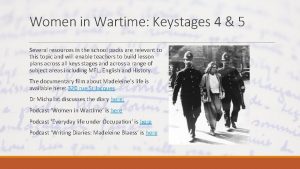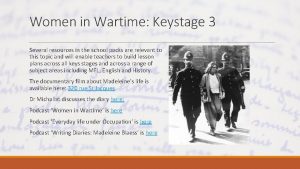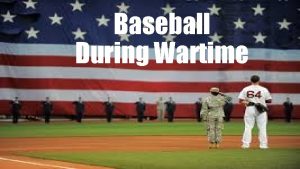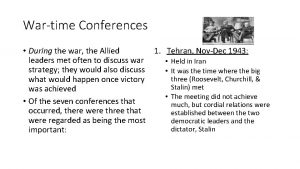Life During Wartime U S Women and the



















- Slides: 19

Life During Wartime U. S. Women and the Military Civil War - WWI

The Civil War • Initially underestimated • Ultimately, four years, hundreds of thousands of lives, incredible amounts of material resources • The longer the duration of a war, the more military leaders looked to women as a resource when additional labor was needed

The work they did • Thousands of women worked in government-owned arsenals and armories • Medical support and relief efforts • Women’s Central Association for Relief – Dr. Elizabeth Blackwell • U. S. Sanitary Commission – Dorothea Dix



The bending, as usual, of gender boundaries during wartime • Women as combatants and commanders – Madame Truchin – Kady Brownell – Bridget Divers – Anna Ella Carroll – Rosetta Wakeman – Frances Clalin – Sarah Emma Edmonds – Sarah Malinda Blaylock

Kady Brownell (1842 - ? ) • May 1861: Company 11, Rhode Island Infantry • Sergeant and colorbearer • Participated in taking of Roanoke Island, January 1862

Francis Clalin

Sarah Emma Edmonds Seelye • In 1862 at least four women, including Sarah Edmonds Seelye, converged on Antietam, Maryland. With more than 30, 000 casualties, September 17 was the single bloodiest day of the Civil War

Albert D. J. Cashier

Anna Ella Carroll • Spied for the Union • Masterminded the Tennessee Campaign, credited with winning the Civil War for the north • Her achievement unrecognized

Dr. Mary Walker


Spanish-American War • Created substantial need for military nurses • First time in Army history large numbers of women hired to serve as contract nurses in military hospitals • Dr. Anita Newcomb Mc. Gee nurses’ bureau chief

Post-Spanish American War Period • Army and Navy leaders take steps to officially include women in American military • 1901: Congress establishes Army nurse Corps as auxiliary; Navy follows seven years later • Women do not have full military status

World War I • First war where women could serve in non -nursing positions • Recruited women for position of yeoman • Marine Corps began its own program in 1918 • Army still only hired nurses

Flu epidemic complicates war • 1918: 1500 nurses requested for troops in France • More than 10, 000 female military nurses served overseas in WWI; over 34, 000 women served in Army, Navy, Marines, or Coast Guard. • Three women received Distinguished Service Cross; 23 received Distinguished Service Medal

How were women viewed within military? • Three general trends: 1. military men remained ambivalent to women in Armed Forces, especially in peacetime.

2. Senior military leaders tended to tolerate women’s participation in the military during wartime. 3. In years preceding WWI, American military leaders concluded that military women were not just a poor substitute for men; questions of women and military then changed to not whether women should serve, but how.
 Chapter 11 section 3 life during wartime
Chapter 11 section 3 life during wartime Chapter 11 section 3 life during wartime
Chapter 11 section 3 life during wartime A wartime alliance begins to erode
A wartime alliance begins to erode Defence estate quality management system
Defence estate quality management system Learning in wartime
Learning in wartime Wartime mistakes peacetime apologies
Wartime mistakes peacetime apologies Chapter 9 section 2 women's in public life answer key
Chapter 9 section 2 women's in public life answer key Women in public life lesson 4
Women in public life lesson 4 Guided reading women in public life
Guided reading women in public life Chapter 9 section 2 women in public life
Chapter 9 section 2 women in public life Hình ảnh bộ gõ cơ thể búng tay
Hình ảnh bộ gõ cơ thể búng tay Bổ thể
Bổ thể Tỉ lệ cơ thể trẻ em
Tỉ lệ cơ thể trẻ em Voi kéo gỗ như thế nào
Voi kéo gỗ như thế nào Tư thế worms-breton
Tư thế worms-breton Hát lên người ơi
Hát lên người ơi Các môn thể thao bắt đầu bằng tiếng nhảy
Các môn thể thao bắt đầu bằng tiếng nhảy Thế nào là hệ số cao nhất
Thế nào là hệ số cao nhất Các châu lục và đại dương trên thế giới
Các châu lục và đại dương trên thế giới
